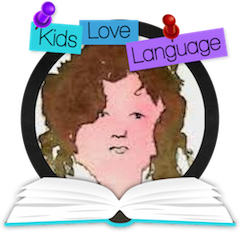Because I travel from school to school, home to district to office and back, I have the mother-lode of wheeled bags. Included are several bags of toys and activities roughly divided by age and/or interest.
We did a lot of testing, but not nearly enough talking and listening.
Now, when SLPs, teachers, and parents watch me do an AAC evaluation they are sometimes confounded. "You're just going to play? That's it?"
Yes.... and No.
Yes, I am playing with your student. I play with bubbles, with Lego blocks, with play houses, with fun apps, with my portable DVD player that I would not be without. I also have nail polish and eye shadow. I have DVDs from Sesame Street to High School Musical to the Super Bowl.
Because what happens during play and fun interactions is "real" communication. I have written in past posts about how often I can go from "Barney" to "want Barney" and "more Barney" and "watch Barney," and eventually to "want watch more."
So, today I thought I'd take you through some of the other toys in my bag and how I model core word use with them.
1. I can't get away from bubbles. I love bubbles, as do most of the kids I work with. My bubbles pages are full of core words; such as blow, pop, catch, more, big, little, high, low, like, sticky.
2. Lego blocks can be difficult for some small and motorically challenged hands. But, if I can get a student to give me directions to build with the legos we have a fun activity. Put it on. Put it next to. Put red. More blue. Yellow on. Make high.
3. Cars and trucks are great fun for kids. I have big. chunky plastic cards for smaller kids and smaller Matchbox type cards for bigger hands. We can Go fast, Go slow, Crash, Beep, Move, Stop, Turn.
4. Puzzles are fun and come in a vast array of degrees of complexity. From chunky wooden puzzle pieces with handles to 50 piece jigsaws I can engage kids with puzzle pictures of their favorite things. We can Put it down, Turn it around, Need more, Not that, Get different one, It fits, Not fit, Pick it up, Give it to me, All done!
5. Play sets are great. I've finally stopped carrying my Fisher-Price Sesame Street House around, but I do keep some pay furniture and home accessories in my bag. As an alternative, I also keep several apps on a separate iPad; such as Toca Tea Party, Play Home, and similar apps where students can direct me to move things around and can interact with them.
With play sets - real or digital - students can experience and try out a wealth of language. More than I can even list here.
I also keep some games on my"fun" iPad for kids who are into gaming, as well as storybook apps that are interactive for some spontaneous shared reading interactions, and some apps that actually tell me something about a student's language skills (i.e. categorizing, matching, labeling, and more).
So, sit down and have a good time with your students when you're evaluating their communication skills and needs. It is possible - and preferable - to determine the array size, vocabulary organization, symbol preferences, and all the other features we look for in an assessment session in a meaningful interaction rather than a "show me what you know" session.
Here is a handout from a presentation I've done on AAC assessments.
Have fun, and..... Keep on Talking!





It is a nice blog about kids and very interesting. Thanks for sharing it.learn blogging
ReplyDelete